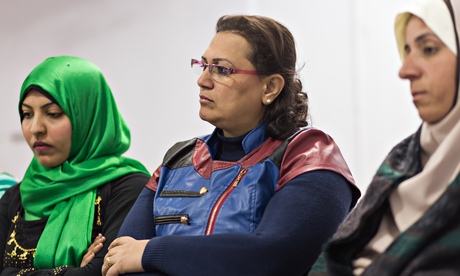
When her family pinned her to her bed 31 years ago, a terrified Mariam Naeem Mossad had no idea what was about to happen, let alone that the experience would affect her for the rest of her life.
“I was screaming: what are you going to do?” Mossad calmly remembers three decades later. “My father never used violence against us while we were kids, so I was very alarmed by what they were going to do to me. I didn’t understand.”
Today, 40-year-old Mossad understands very well. This was the day that her nine-year-old self joined the estimated 91% of Egyptian women subjected to female genital mutilation – a figure that leaves Egypt responsible for 25% of all FGM procedures worldwide.
For her family, who believed like many Egyptians that the mutilation would safeguard her chastity, the day was cause for celebration. But for Mossad it was one of horror.
“They got four people,” Mossad remembers, “each one holding a limb. Two for the hands and two for the legs.”
And the trauma did not end with the operation. After she was cut by a local midwife, she bled repeatedly for a fortnight, and her recollection of the period is hazy. “I didn’t know what was happening. I only saw my mother constantly changing the sheet with blood on it.”
But like many victims of FGM, Mossad says she did not initially question FGM, once she found out what it was. As a Christian, Mossad faced little religious pressure to support the practice. (Some Muslims in Egypt claim FGM is an Islamic requirement, though imams who have researched the issue say it has no root in the religion, and point out it is practised far less in other countries with Muslim majorities.) But nevertheless Mossad saw it as part of her culture, despite the physical and psychological pain it caused her.
Mossad’s friends were all subjected to FGM, and she considered it normal. As the years went by, she remembers seeing a television campaign that discouraged the practice. But she didn’t feel particularly convinced by it.
All this gradually changed once she got married, moved from Cairo to the southern province of Sohag, and became a teacher. In the process of researching for her classes, she read widely, and increasingly began to question her assumptions about FGM.
So after the birth of her 11-year-old daughter – named Mariam, after her mum – Mossad shocked her family by deciding not to mutilate her. Unlike some men, her husband was easily convinced. But Mossad’s toughest opponent was her mother, who started demanding her grand-daughter’s mutilation from when she was just 11 months old.
“It’s a custom and tradition,” Mossad’s mother told her, “and all the girls are circumcised.” But Mossad told her: “No, it’s not happening … [Even] if you forgot what happened to me when I was younger, when I was circumcised, I can never forget it. So I will not do this to my daughter.”
According to Mossad, now a full-time anti-FGM campaigner, grandmothers and mothers-in-law are sometimes the biggest proponents for mutilating their grandchildren. Even though women often complain that the psychological trauma of FGM has complicated their sex life with their husbands, “they still feel this is a cultural thing that has to be done”.
Mossad feels that one of the best ways to change this culture is to remind families that FGM is a crime, not a cultural inheritance. The recent conviction of a doctor and father for mutilating a 13-year-old girl in 2013 – the first ever case in Egypt – was a start, she says. But the short jail terms were not a harsh enough deterrent.
“Whenever we’re raising awareness, [and we’re] telling the fathers that this is criminalised, they don’t care that much because they don’t believe it could happen to them.”

